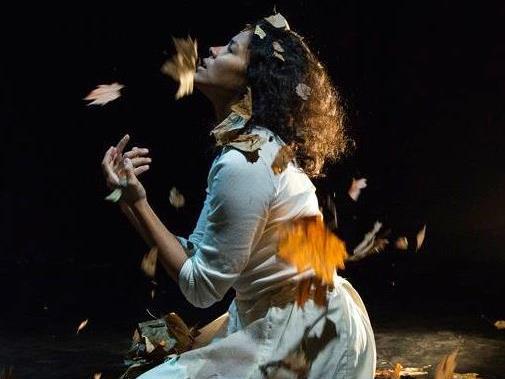Zahra Newman in The Mill on the Floss Photograph by Pia Johnson.
This shouldn’t work. Staging a 19th century novel that spans decades, weaves through devastated fortunes and floods and all without the support of expensive production values – on the surface, this should be impossible. It seems reserved for the Melbourne Theatre Company or some passing international tour in town for two weeks at the Princess Theatre, not for an independent company occupying Theatre Works for a limited season. With the odds stacked against them, local physical theatre exponents OpticNerve have crafted a jaw-dropping and accessible production lead by a rich ensemble resulting in an experience that is at once provocative and poetic with sprinklings of the absurd. That production is The Mill on the Floss.
Based on George Eliot’s (the pseudonym of Mary Ann Evans) 1860 novel, the superb adaptation is by the acclaimed British playwright and screenwriter Helen Edmundson (who has previously adapted Therese Paquin and Anna Karenina). The production follows the central character – precocious Maggie Tulliver (a projection of George Eliot) – whose tomboyish behaviour and sharp intelligence put her at odds with the society around her. Her independence also tests her relationship with her older brother Tom, especially when faced with their father’s debts and her relationship to the deformed Philip, whom Tom despises – the tragic ending is certain. The role of Maggie is shared between Maddie Nunn, Zarha Newman and Rose Lockhart, each bringing vulnerability, warmth and strength to Maggie at various stages of her life.
Eschewing set for the bodies of her cast and employing an intimate “u” seating plan, Tanya Gerstle’s production relies entirely on suggestion – taking Brechtian principles to the extreme and expressing complex ideas with haunting and devastating simplicity. A flood, a barn, a meeting hall – all come to life, avoiding the cheesy pitfalls that such theatre can fall into. Gerstle’s great skill is knowing when to back off, allowing the text to speak for itself. Her deft hand keeps the action flowing, with the minimalism somehow making the story all the more epic.
As mentioned, performances are all top notch, even if some actors had trouble adjusting between their varied characters; this barely detracts. Newman slides between characters with ease while Nunn is utterly irresistible as the young Maggie, injecting the character with spirit, curiosity, playfulness and fear. Also look out for the talents of George Lingard and Grant Cartwright and their strong characterisations.
Lucy Birkinshaw and Stewart Campbell’s ethereal lighting design, consisting of shafts of side lighting and overhead spotlights is impressive without being intrusive. Sound designers Russell Goldsmith and Tom Backhaus’ soundscapes are a highlight – rich, layered and seductively melancholic.
Given its themes of the social subjugation of women, both in previous times and today, The Mill on the Floss could be seen as a potent companion piece with this year’s earlier A Room of One’s Own, which played at the Courthouse. Both productions have brought theatrical innovation to the same, troublingly relevant subject matter centuries after their source materials were penned. It is food for thought and bait for passionate post-show debate that is sure to erupt after the curtain call.
The Mill and the Floss is a beguiling piece of poetic melancholy – a delicious treat for theatre goers to devour and for literary buffs to treasure – definitely not to be missed!
Rating: 4.5 stars out of 5
The Mill on the Floss
By George Eliot
Adapted by Helen Edmundson
By arrangement with The Agency (London) Ltd.
Director Tanya Gerstle
Performers Zahra Newman, Grant Cartwright, Luisa Hastings Edge, Tom Heath, Rosie Lockhart, Maddie Nunn,
George Lingard, James O’Connell
Producer Hannah Liddeaux
Workshop Manager Loraine Little
Workshop Director Stephen Phillips
Sound Design Russell Goldsmith
Lighting and Set Construction Lucy Birkinshaw and Stewart Campbell
Stage Manager Luke Preer
Costume Design Yahav Ron
Voice and Dialect Coach Geraldine Cook
Singing Design Richard Lawton
Production Intern Hayley Sorrel
Theatre Works, St Kilda
28 July – 13 August 2016





